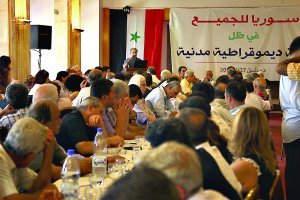Syrian Opposition Conference Leads to Key Demands

Event seen as achievement, although hopes for progress remain slim
Three months after the outbreak of the revolution against the regime in Syria, the leaders of the opposition held their first conference to discuss the best ways to emerge from this crisis and move towards a democratic system.
The opposition held their first conference in Damascus, under the title of “A Peaceful Transition to Democracy and a Civil State and The End of the Tyrannical Regime.”Many expressed their regret over the repression and abuse practiced towards people who are demanding freedom as a way of life after 50 years of silence.
Amongst the questions raised was this: if we had asked the Syrian regime six months ago if there were armed gangs in Syria, the answer would have been “absolutely not”. If we ask this regime if there are armed gangs now, the answer would be “definitely yes.”The problem is – if you accept the Syrian regime’s point of view – is how has the country suddenly turned into an Afghanistan filled with many armed and highly trained gangs with plenty of advanced and sophisticated weaponry? And how has this huge amount of weapons entered Syrian territory, while there are more than 15 security branches working on counting each inspiration and exhalation of every citizens’ breath?
Nevertheless, the conference was considered by many to be a historic moment, as it gathered 175 people from the opposition in the centre of Damascus. Those involved had never dreamed of being able to meet and try to overthrow the regime this way, even by default.The general coordinator of the conference, writer Louay Hussein, tried to draw the attention of the attendees to the distance of the state from the political movement happening in the street.
“All the attendees are neither insurgents nor terrorists nor saboteurs, or have any agenda drawn in advance,” he said. “They have only said what they have been always saying, that the autocratic regime that has ruled the country must disappear and a democratic civilian regime must be established on the basis of citizenship and human rights to achieve justice and equality for all Syrians,” he added. The well-known opposition figure Michel Kilo proposed solutions to the crisis created by the system and its tyranny.
“The internal opposition was alone throughout its struggle against this system,” he said. “However, it neither compromised nor equivocated nor conceded. Today, there are millions in the streets. The opposition will remain as is and will remain with this popular movement.”
Participants spent eight hours discussing a wide variety of ideas of opinions and agreed on a number of key demands.
These included supporting the popular movement and their goals, and a transition to a pluralistic state that guaranteed the equality of all citizens regardless of race, gender and religion.
The conference also called for the end of the security crackdown and the withdrawal of the security forces from towns and villages, followed by the formation of a commission of inquiry.
They demanded guaranteed freedom of peaceful demonstration without prior permission, the release of prisoners of conscience and political detainees and the end of media distortion and sectarian incitement.
Participants also emphasised that refugees and internally displaced people should be returned to their homes, and stressed that they were not calling for foreign intervention to insure the rights of the Syrian people.
During the conference, a number of regime supporters gathered in front of the Semiramis hotel, owned by a young businessman close to the president.
The regime supporters chanted, “God, Syria, Bashar and no one else”, as well as slogans accusing attendees of treason. Police intervened to open the roads surrounding the hotel, after the anti-opposition demonstrators tried to close them. Some entered the hall at the close of the press conference held at the end of the meeting, and started shouting slogans in support of al-Assad. The conference came out with points that were praised by everybody, even by the Syrian regime. But many wondered about how effective those suggestions can be, as the regime confirmed that fresh dialogue will begin on July 10 and the street protests continue.

